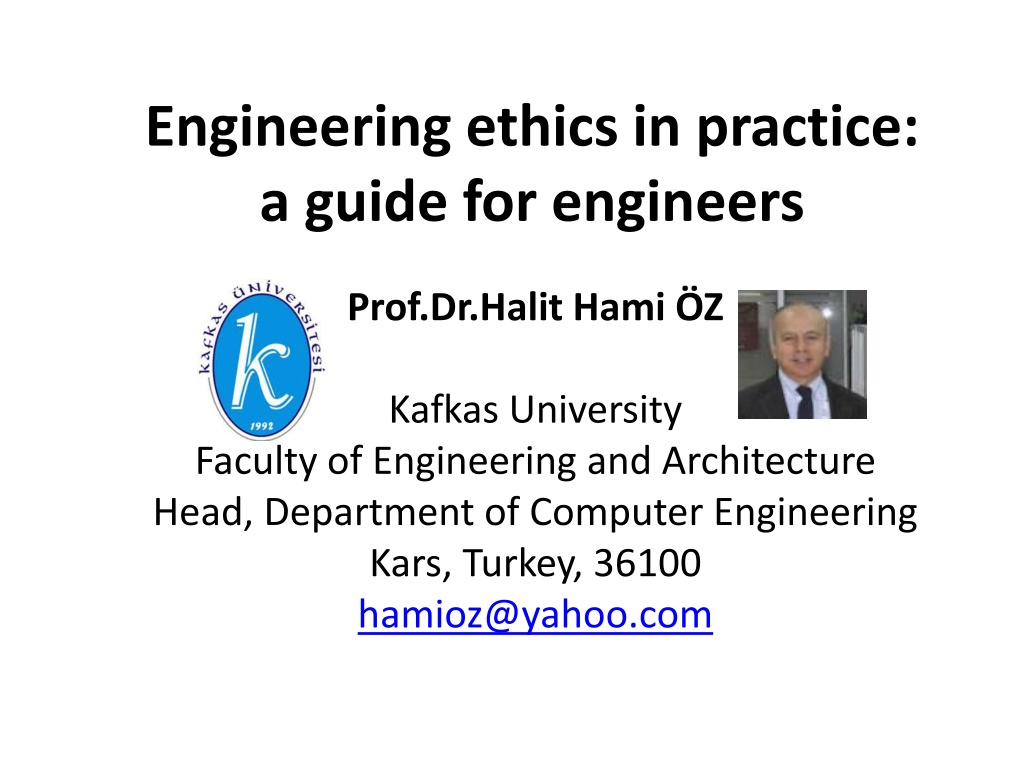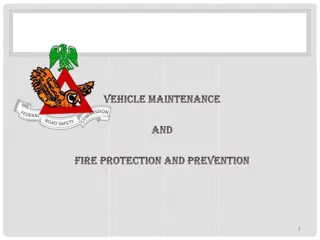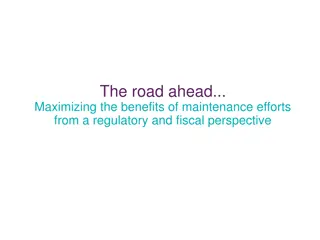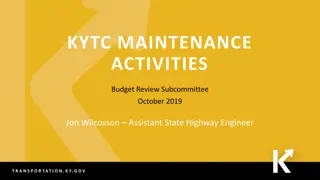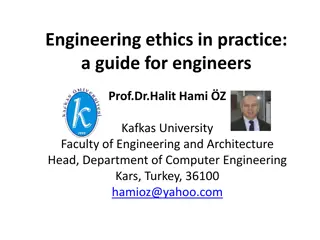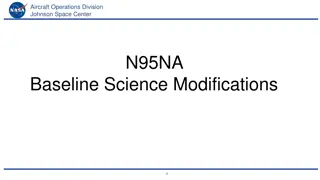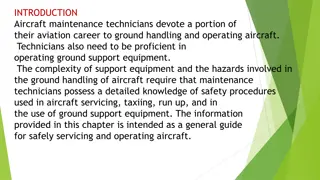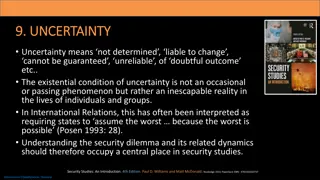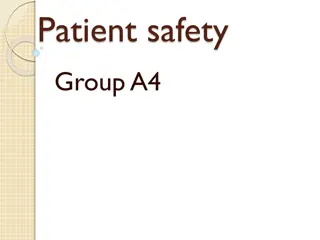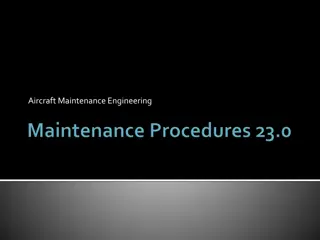Ethical Dilemma in Aircraft Maintenance: Quality vs. Compliance
An aircraft maintenance team faces an ethical dilemma when instructed to replace pump casing studs with poor quality replacements, potentially compromising safety. Despite pressure to comply, the engineer must navigate between upholding reputation and ensuring safety.
Download Presentation

Please find below an Image/Link to download the presentation.
The content on the website is provided AS IS for your information and personal use only. It may not be sold, licensed, or shared on other websites without obtaining consent from the author. Download presentation by click this link. If you encounter any issues during the download, it is possible that the publisher has removed the file from their server.
E N D
Presentation Transcript
Engineering ethics in practice: a guide for engineers Prof.Dr.Halit Hami Z Kafkas University Faculty of Engineering and Architecture Head, Department of Computer Engineering Kars, Turkey, 36100 hamioz@yahoo.com
I used the Engineering ethics in practice: a guide for engineers book written by The Royal Academy of Engineering for teaching as well as making the ppt presentations about the Engineering Ethics course Prof.Dr.Halit Hami Z Prof.Dr.Halit Hami OZ - Engineering Ethics Course 2
4.5 The reputation of engineering Act honourably, responsibly and lawfully and uphold the reputation, standing and dignity of the profession Scenario You are the member of a team is responsible for the regular maintenance of a fleet of 10 aircraft for a small, airline. Recently, a jet has caught fire and crashed over the North Sea and your team is charged with examining the wreckage to see if any malfunction occurred. They quickly identify that the crash was due to the failure of a pump casing; in particular, studs that attach the pump casing have failed. You put these findings into a report which you pass on to your superior. Prof.Dr.Halit Hami OZ - Engineering Ethics Course 3
4.5 The reputation of engineering Three days later a memo is circulated by Head Office instructing all maintenance teams to replace all pump casing studs on every jet of this kind in the fleet. Replacement studs are delivered to the workshops with instructions that this job is to be undertaken as a matter of urgency, with crews working over the weekend to ensure its swift completion. Prof.Dr.Halit Hami OZ - Engineering Ethics Course 4
4.5 The reputation of engineering You examine the new studs that are to be put in all aircraft. You come to the conclusion that they are of poor quality: the studs have cut threads where the old studs had rolled threads (rolled threads have a better fatigue resistance). You are not convinced that the replacement studs have the physical capacity to keep the pump casings on securely and believes that this may lead to further accidents. Prof.Dr.Halit Hami OZ - Engineering Ethics Course 5
4.5 The reputation of engineering However, the order to replace the studs has come from on high , and under normal circumstances you would be under an obligation to obey such an order. You are hoping for promotion in the next 6 months and do not want to be marked out as a troublemaker. Prof.Dr.Halit Hami OZ - Engineering Ethics Course 6
Dilemma Imagine you are an engineer working for an overseas airline, given orders to replace the studs attaching the pump casings on all the jets under your control, but you believe the replacement studs to be of poor quality. As a relatively junior member of staff you are expected to follow orders and you are worried that raising your concerns in this case could be detrimental to your career. However, as an engineer your primary responsibility is to ensure the safety of the jets under your control, their pilots, crew and passengers. You believe that if you simply follow the orders that you have been given to replace the studs, you will not be acting responsibly and the safety of the jets will be compromised. What course of action should you take given your competing responsibilities to obey orders and to maintain the safety of the jets, and considering your concerns for your career? Prof.Dr.Halit Hami OZ - Engineering Ethics Course 7
What should you do? You could decide simply to follow your orders. A decision has been taken at a high level that this course of action is the best for the safety of the jets, and so you could argue that it is possible both to obey orders and fulfil your responsibility for safety by replacing the studs. You could inform your superior of your concerns and recommend that work not proceed until evidence has been provided to demonstrate that the studs are not of poor quality, or new high quality studs have been delivered. You could refuse to carry out your orders and raise your concerns that this is a rush job that threatens safety directly with senior company executives. You could pass your concerns to the media. There has been substantial interest in air safety since the original jet crash, and you will be able to prevent what looks like the prioritisation of public relations over the safety of pilots and passengers. Prof.Dr.Halit Hami OZ - Engineering Ethics Course 8
Discussion You have been given an order to replace the studs on the jets under your control with the new studs that have been provided. Moreover, this order has been issued as a response to a report that you yourself submitted stating that the cause of the recent jet crash can be traced to a failure in the studs on that aircraft. You are worried about taking actions that look like they are going against your orders. In particular, you don t want to risk the promotion that you hope to receive in the near future. Prof.Dr.Halit Hami OZ - Engineering Ethics Course 9
Discussion Looked at in this way, it seems that the best ethical course of action would be option 1. Replacing the studs fulfils your responsibility to maintain the safety of the jets, meets your obligation to follow orders and also recognises the responsibilities you have to yourself and any dependents for keeping your job and furthering your career. However, this analysis does not take into account the further information you have from examining the replacement studs. This information provides strong evidence that, despite the order being issued in response to your report, replacing the studs will actually be detrimental to the safety of the jets. Prof.Dr.Halit Hami OZ - Engineering Ethics Course 10
Discussion It is hard to see how simply ignoring this information is compatible with acting responsibly. Furthermore, were others to become aware that you had ignored it your reputation as an engineer, and by association the reputation of engineers in general would be damaged. Option 1 therefore seems contrary to the principle to uphold the reputation, standing and dignity of the profession . Prof.Dr.Halit Hami OZ - Engineering Ethics Course 11
Discussion The other three options all present ways in which you could act on your concerns. You might think, then, that passing your concerns to the media would be for the best: it would be the course of action most likely to bring about a review of the order to replace the studs, and hence fulfil your responsibility to maintain safety. However, this is also the option that is most at odds with both your obligation to obey orders and protect your career interests. It could also harm your reputation as an engineer if it was thought that you were passing on confidential information without good reason. Prof.Dr.Halit Hami OZ - Engineering Ethics Course 12
Discussion With regard to these considerations, informing your direct superior of your concerns appears the most appropriate option, followed by bypassing the chain of command and going directly to senior officers. Simply going on the information available, you have no evidence that either of these options would be ineffective in addressing your safety fears. Prof.Dr.Halit Hami OZ - Engineering Ethics Course 13
Discussion If informing your superior of your concerns is effective in ensuring the safety of the aircraft then it would appear to be the best compromise between your competing obligations; if this option proves to be ineffective, it does not rule out going directly to senior officers or passing your concerns to the media. These other options would also be more obviously justifiable if you had already tried to go through the appropriate channels. Failing to do so would leave you open to criticism, which might even prevent your intervention from being effective. Prof.Dr.Halit Hami OZ - Engineering Ethics Course 14
Summary In the first instance, informing your superior of your concerns and recommending that work not proceed seems like a good option, balancing your obligations to your employer with your responsibility to the safety of the aircraft. However, you are mindful that your primary responsibility is to the safety of the aircrew and the safe operation of the aircraft. Meeting this responsibility and upholding your reputation as an engineer may require you to take further actions if this one proves ineffective. How could further information change this assessment? What if it would take time to go through your superior, resulting in many jets receiving the new studs? What if you believed that this was just one example of systemic problems in aircraft maintenance? Prof.Dr.Halit Hami OZ - Engineering Ethics Course 15
Other ethical considerations involved in this case As well as the reputation of engineering, this case also highlights the requirement to hold paramount the health and safety of others as part of a general duty to have respect for life, law and the public good. In addition, this case also involves questions of honesty and integrity. Although the flight engineer s primary concern must be with safety, he also has a duty to act in a trustworthy way and respect the rights and reputation of his employer. In fact, upholding the reputation, standing and dignity of engineering will involve being seen to uphold all relevant ethical principles. In this case accuracy andrigour in evaluating the order that was issued, and exercisingresponsible leadership of the team of engineers. Prof.Dr.Halit Hami OZ - Engineering Ethics Course 16
5-Chapter introduction - Responsible leadership: Listening and informing Give ethics a prominent place in all that the institutions do. Communicate this widely and frequently through the media. Work closely with other professional groups e.g. medicine to learn from their approach. Hold discussions with others from non engineering/scientific backgrounds e.g. philosophers to gain a broader insight into how they view and handle ethical issues. Engineering ethics in practice survey, in response to the question: Do youfeel that the engineering profession could be doing more to promote engineering ethics and to support engineers? Prof.Dr.Halit Hami OZ - Engineering Ethics Course 17
5-Chapter introduction - Responsible leadership: Listening and informing Under the heading, Responsible Leadership: Listening and Informing , the Statement of Ethical Principles states that professional engineers should aspire to high standards of leadership in the exploitation and management of technology. They hold a privileged and trusted position in society, and are expected to demonstrate that they are seeking to serve wider society and to be sensitive to public concerns. This guide focuses largely on cases in which an engineer has to make a decision, often at a particular time. In presenting a report, for example, the engineer is required to be honest and objective. Or, if offered a bribe, an engineer is required to reject the bribe. We can think of these as requirements for an individual engineer, at a particular time. If the engineer fails to be honest, or if he accepts a bribe, the engineer does something wrong. Prof.Dr.Halit Hami OZ - Engineering Ethics Course 18
5-Chapter introduction - Responsible leadership: Listening and informing Not all ethical considerations are like this. If we think about the engineering profession as a whole, there might be responsibilities that apply to the profession, without being the responsibility of any specific individual professional. Professional bodies can engage with politics, campaigning for changes in the law and so on. For example, the medical profession gets involved with debates on the safety of sports such as boxing, or on public health policies relating to issues such as childhood obesity. It is plausible to think that this is a part of the profession s responsibilities but, typically, we would not claim that any particular doctor had done something wrong if they were not involved in any particular campaign. It may be perfectly permissible for any given individual not to be involved in any of these wider activities but something would be lost if the medical profession as a whole was not involved in public debate and had no part to play in forming public policy. Indeed it may be thought that the medical profession fails if it does not engage in this way. Prof.Dr.Halit Hami OZ - Engineering Ethics Course 19
5-Chapter introduction - Responsible leadership: Listening and informing Similarly, while it may be acceptable for any individual engineer to choose not to be involved in political debate, there may be an obligation for the engineering profession as a whole to engage in these wider activities. Issues such as climate change, energy security, the protection of personal data and so on are high profile policy issues to which the engineering profession can make an important contribution. Prof.Dr.Halit Hami OZ - Engineering Ethics Course 20
5-Chapter introduction - Responsible leadership: Listening and informing Hence, there is a specific interpretation of leadership in this guide. This principle above could refer to the duty that engineers have to be responsible leaders when managing other engineers. As such, listening and informing would be a reference to the duty of a senior engineer to listen to the other engineers he is working with, and to keep them informed. Although this is important, this principle refers to the responsibility not of individual engineers, but of the engineering profession as a whole, to provide responsible leadership, to listen to society and to engage with the public. However, it is individual engineers who must make the decision to follow this principle. If there are no engineers who engage with the wider debates in society, then the profession as a whole cannot fulfil this responsibility. How these responsibilities of the profession translate into individual responsibilities Prof.Dr.Halit Hami OZ - Engineering Ethics Course 21
The boxes below give some brief engineering examples relating to responsible leadership Some have argued that a number of major engineering disasters such as the Hatfield rail crash occurred not because engineers made mistakes or made the wrong decisions, but because engineers were not sufficiently involved in the decision making. In a number of large companies, there has been a move towards reducing the number of engineers involved at the higher levels of management, so that engineers have less direct involvement in a number of crucial decisions. This is a trend that the engineering profession could try to address, for example by inviting and promoting dialogue on measures to promote health and safety. Prof.Dr.Halit Hami OZ - Engineering Ethics Course 22
The boxes below give some brief engineering examples relating to responsible leadership One concern that some people have about carbon capture technologies as a response to global warming is that the prospect of a technical solution to the problem may discourage people from using energy more responsibly. One way in which the engineering profession could respond to this concern would be to be active in explaining all the different implications of implementing the new technology, encouraging a wide and balanced debate that captures both the positive and negative aspects. Prof.Dr.Halit Hami OZ - Engineering Ethics Course 23
The boxes below give some brief engineering examples relating to responsible leadership Frequently, whistleblowers suffer as a result of their effort to expose corrupt, fraudulent or unsafe practices. Arguably, professional bodies could do more to protect the engineers who risk their own careers to help protect others, and similarly engineers could do more to encourage their professional bodies to do more Prof.Dr.Halit Hami OZ - Engineering Ethics Course 24
5-Chapter introduction - Responsible leadership: Listening and informing In the following sections, more detailed cases are used to illustrate different aspects of responsible leadership. These cases are designed to be challenging, and to allow reflection on what the principle means in practice. Prof.Dr.Halit Hami OZ - Engineering Ethics Course 25
5.1 Listening to society Professional engineers should be aware of the issues that engineering and technology raise for society, and listen to the aspirations and concerns of others. Scenario Adrian Slattery is a leading researcher in nuclear technologies and also an active campaigner for nuclear power, arguing that it is without doubt the most important part of a sensible response to the problem of global warming. He frequently attends events debating the pros and cons of nuclear power, including those open to the public and debates with leading politicians. He has now been asked to write an article about the future of energy production, and nuclear power in particular, for a national newspaper. Prof.Dr.Halit Hami OZ - Engineering Ethics Course 26
5.1 Listening to society Increasingly, Adrian finds himself becoming frustrated with what he considers to be irrational attitudes, arguing that most people willingly participate in activities that are statistically more likely to harm them than a nuclear power station. Furthermore, he also argues that the public seem to over-emphasise the risks involved with nuclear power while simultaneously under-estimating the impact that global warming will have if we don t radically change our use of energy and our energy sources. Prof.Dr.Halit Hami OZ - Engineering Ethics Course 27
5.1 Listening to society As a result, he writes an article that is very critical of what he considers to be people s irrational fear of nuclear power. Furthermore, he argues that there is an element of selfishness in people s attitudes. Although the UK will of course be affected by global warming, it is other countries (and future generations) that will suffer the most severe consequences. A s such, he considers the UK public to be selfish and irresponsible, willing to expose future generations and individuals from other countries to much greater risks as a result of our energy consumption, rather than accepting the (relatively) small risk that comes from nuclear power. Prof.Dr.Halit Hami OZ - Engineering Ethics Course 28
5.1 Listening to society Finally, in his conclusion, Adrian argues that the politicians responsible for making the decisions should simply ignore any opposition to nuclear power, and must instead embrace it, regardless of public concerns. Prof.Dr.Halit Hami OZ - Engineering Ethics Course 29
Dilemma Imagine that you are in Adrian s position, and share his beliefs. You passionately believe that nuclear power is the only real solution to the problem of global warming, but you are frustrated by the public s opposition to it. You want to work to promote a proper understanding of the benefits of nuclear power, and to highlight the dangers of not using it, but you don t know how to deal with the public s opposition. How should you approach the article? Prof.Dr.Halit Hami OZ - Engineering Ethics Course 30
What should you do? Like Adrian, you could stress the importance of nuclear power, and argue that it must be embraced, regardless of public concerns. Alternatively, although arguing that nuclear power is a necessary part of the solution to global warming, you could argue that the decisions made must be informed by the beliefs and concerns of those who will be affected by the decision. You could stress, however, that those affected by these decisions include individuals from other countries, as well as those from the UK. You could argue that we live in a democracy, and therefore the decisions made regarding the UK s energy sources should be made by the UK s voters. After all, engineers are not the only experts to claim that the public do not understand the finer details. Economists, of course, will complain that the public do not have a proper understanding of economics. Nevertheless, we all expect to be able to vote for the party of our choice, and frequently do so, on the basis of the party s economic policies. Nevertheless, you could, of course, do what you can to engage people in a public debate and to persuade them that nuclear power is the right solution. Prof.Dr.Halit Hami OZ - Engineering Ethics Course 31
Discussion The point of this case isn t to take a stance on nuclear power, whether to support the position taken by Adrian Slattery, or to criticise that view. That s why, in the summary of the dilemma, we stressed that, as well as being in his position, you also share his views. If you don t share his views, you can, of course, consider a different example with similar issues. The point of this case is simply to focus on the principle of listening to society, and one important point that has to be considered in relation to this principle is that you may not always like, or agree with, what society has to say. Furthermore, not only might you disagree, you might think that the public are ignorant of the relevant facts and lack the relevant expertise. As such, for some, it is tempting to ask, why should we listen to society? Prof.Dr.Halit Hami OZ - Engineering Ethics Course 32
Discussion In these cases, however, there are two points to consider before dismissing public opinion too quickly. First, something that appears to be irrational may not be on closer inspection. Consider, for example, the view that it is irrational to oppose nuclear power while participating in other activities that are statistically more dangerous. In this case, it is a mistake to compare the two risks without recognising the fact that people have very different attitudes to risks they voluntarily choose (e.g. crossing the road) and those that are imposed on them, without their voluntary consent (e.g. nuclear power, potentially). Second, even if you do think people are irrational or misinformed, there is still reason to think that people have some right to consent (or not) to decisions that will have a major impact on their lives. Prof.Dr.Halit Hami OZ - Engineering Ethics Course 33
Discussion Consider the doctor/patient relationship. In medical ethics, people often contrast the doctor-knows-best model with the informed consent model. According to the former, the patient is simply not qualified to make a decision for himself. He does not have a sufficient understanding of medicine, or of his illness, and therefore the doctor ought to simply prescribe the appropriate treatment, without any real dialogue with the patient. The doctor just prescribes the appropriate drugs, and the patient is expected to trust the doctor. Prof.Dr.Halit Hami OZ - Engineering Ethics Course 34
Discussion In contrast to this, the law requires the doctor to obtain consent from the patient. It is the doctor s duty to explain (in terms the patient can understand) the potential benefits of the available drugs (or other treatments), and the possible risks. It is then the patient s decision whether to consent to treatment or not. If the patient decides to act against his doctor s advice that is (usually) his right. The doctor may disagree with the patient s choice but (assuming the patient is competent) the doctor must respect the patient s wishes. Prof.Dr.Halit Hami OZ - Engineering Ethics Course 35
Discussion Of course, engineers working on large scale projects cannot usually get informed consent from every individual who could plausibly be affected. However, engineers should, at least, listen to society, and give some weight to society s views even if they do not share them. Prof.Dr.Halit Hami OZ - Engineering Ethics Course 36
Summary In this case, Adrian Slattery is convinced that the public are failing to recognise the importance of nuclear power, and is inclined to think that the solution is simply to ignore public opinion. Although we may think there is reason to have some sympathy for that view, there is also good reason to engage with the public, not only to inform them, but also to listen to the views and concerns of the members of society, and to consider people s values. Prof.Dr.Halit Hami OZ - Engineering Ethics Course 37
Other ethical considerations involved in this case Obviously, one other principle that is central in this case is promotingpublic awareness. Promoting public awareness and listening to society willgo together, as part of a dialogue between engineers and society. Other principles that are relevant to this case (or similar cases) are evaluatingrisks, affecting others, and upholding the reputation of the engineeringprofession. Prof.Dr.Halit Hami OZ - Engineering Ethics Course 38
